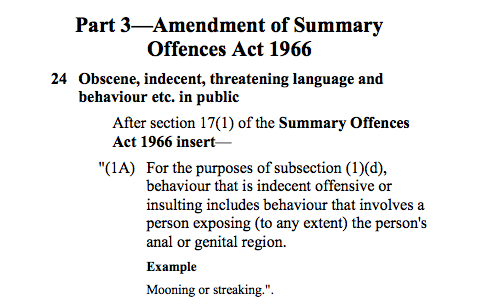The Victorian government is in the process of overhauling its sexual offence laws to bring them into the 21st century, and one of the first victims is the great Australian tradition of getting your bum out in public and throwing a brown eye.

The Andrews government has introduced the Crimes Amendment (Sexual Offences) Act 2016 to overhaul more than 50 offences to account for evolving technologies and new ways of offending, such as when a person exposes themselves over the internet rather than in person.
As part of the overhaul, the government has made clear the difference between "sexual" exposure, such as flashing, and "indecent or offensive", such as mooning someone or streaking at a sporting event.

Mooning and streaking have technically always been against the law - and are punishable by significant fines or even jail time for repeat offenders - but this is the first time they have been specifically mentioned in legislation.
Victorian attorney general Martin Pakula explained the changes on 3AW on Monday morning, saying he didn't want to ruin anyone's fun, but needed to make clear the difference between sexual offences and less serious crimes.
"Sexual exposure is a much more serious type of offence, it's flashing and things of that nature. In the context of separating those things out... we've given examples of what might fall into each category," he said.
Pakula said it would be at the discretion of police and the courts to decide which acts would be punished as sexual offences and which acts fall into the less serious "indecent" category.

Mooning and streaking weren't the sole targets of the new laws, with many of the changes made to bring the Summary Offences Act into the 21st century.
The term "child pornography" has been replaced with "child abuse material" to better reflect the true nature of the crime. The offence of committing an indecent act in the presence of a child, which previously only applied if the child was physically present with the accused, will now apply to a person using digital technology such as Skype or Snapchat.
“Many of our current sexual offence laws are incomplete, too complex and use outdated language. These amendments will make our laws clearer and better understood, assisting juries in criminal trials," Pakula said in June.
“We’re giving police the legislative changes they need to deal with offences that are increasingly taking place through modern technologies.”
